|
Books Should Be Free Loyal Books Free Public Domain Audiobooks & eBook Downloads |
|
|
Books Should Be Free Loyal Books Free Public Domain Audiobooks & eBook Downloads |
|
Religion |
|---|
Book type:
Sort by:
View by:
|
By: Leo Tolstoy (1828-1910) | |
|---|---|
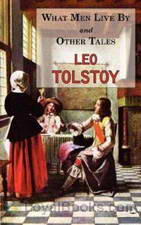 What Men Live By and Other Tales
What Men Live By and Other Tales
Although Leo Tolstoy (1828-1910) was a wealthy landowner, in his later life he had what was considered a “religious awakening.” This experience went on to inform his writing and his lifestyle in profound ways. His views transcended the specifics of religion, as known in his day – so much so he came to be a helpful guide both to Mohandas Gandhi and to Dr. Martin Luther King Jr. The four stories in this collection ask profound questions and gently supply helpful, non-dogmatic hints to their... | |
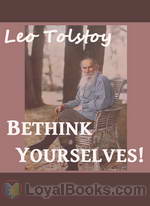 Bethink Yourselves!
Bethink Yourselves!
As Russia goes to war against Japan, Tolstoy urges those at all levels of society, from the Tsar down to the common soldier, to consider their actions in the light of Christ's teaching. "However strange this may appear, the most effective and certain deliverance of men from all the calamities which they inflict upon themselves and from the most dreadful of all—war—is attainable, not by any external general measures, but merely by that simple appeal to the consciousness of each separate man which, nineteen hundred years ago, was proposed by Jesus—that every man bethink himself, and ask himself, who is he, why he lives, and what he should and should not do... | |
By: Mark Twain (1835-1910) | |
|---|---|
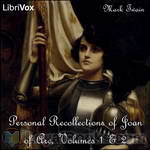 Personal Recollections of Joan of Arc, Volumes 1 & 2
Personal Recollections of Joan of Arc, Volumes 1 & 2
Mark Twain’s work on Joan of Arc is titled in full “Personal Recollections of Joan of Arc, by the Sieur Louis de Conte.” De Conte is identified as Joan’s page and secretary. For those who’ve always wanted to “get behind” the Joan of Arc story and to better understand just what happened, Twain’s narrative makes the story personal and very accessible. The work is fictionally presented as a translation from the manuscript by Jean Francois Alden, or, in the words of the published book, “Freely Translated out of the Ancient French into Modern English from the Original Unpublished Manuscript in the National Archives of France... | |
By: Unknown | |
|---|---|
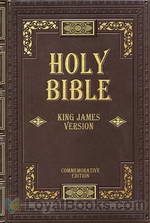 The Bible, King James Version (KJV) - Introduction
The Bible, King James Version (KJV) - Introduction
Variously known as the Greatest Story Ever Told, The Book of Books and many other names, the Bible is reputed to be the biggest bestseller of all time. Translated into thousands of world languages and studied, worshiped and revered in the four corners of the earth, the Bible remains Christianity's canonical text and is considered the Word of God. The King James Version (KJV) is a translation commissioned by the Church of England in 1604 and the work continued till 1611. However, it wasn't the first translation into English from the original Hebrew, and some portions in Aramaic... | |
By: Frances Hodgson Burnett (1849-1924) | |
|---|---|
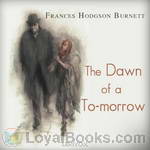 The Dawn of a To-morrow
The Dawn of a To-morrow
A wealthy London business man takes a room in a poor part of the city. He is depressed and has decided to take his life by going the next day to purchase a hand gun he had seen in a pawnshop window. The morning comes with one of those 'memorable fogs' and the adventure he has in it alters his decisions and ultimately his life. | |
By: Robert Louis Stevenson (1850-1894) | |
|---|---|
 Lay Morals
Lay Morals
| |
 Father Damien, an Open Letter to the Reverend Dr. Hyde of Honolulu
Father Damien, an Open Letter to the Reverend Dr. Hyde of Honolulu
| |
 Vailima Prayers and Sabbath Morn
Vailima Prayers and Sabbath Morn
| |
By: Alexandre Dumas (1802-1870) | |
|---|---|
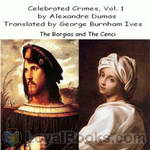 Celebrated Crimes
Celebrated Crimes
Dumas's 'Celebrated Crimes' was not written for children. The novelist has spared no language -- has minced no words -- to describe the violent scenes of a violent time.In some instances facts appear distorted out of their true perspective, and in others the author makes unwarranted charges. The careful, mature reader, for whom the books are intended, will recognize, and allow for, this fact.The first volume comprises the annals of the Borgias and the Cenci. The name of the noted and notorious Florentine family has become a synonym for intrigue and violence, and yet the Borgias have not been without stanch defenders in history... | |
By: G. K. Chesterton (1874-1936) | |
|---|---|
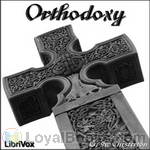 Orthodoxy
Orthodoxy
Orthodoxy is a book that has become a classic of Christian apologetics. In the book's preface Chesterton states the purpose is to "attempt an explanation, not of whether the Christian faith can be believed, but of how he personally has come to believe it." In it, Chesterton presents an original view of the Christian religion. He sees it as the answer to natural human needs, the "answer to a riddle" in his own words, and not simply as an arbitrary truth received from somewhere outside the boundaries of human experience. | |
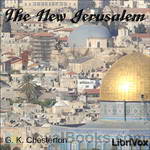 The New Jerusalem
The New Jerusalem
“On the road to Cairo one may see twenty groups exactly like that of the Holy Family in the pictures of the Flight into Egypt; with only one difference. The man is riding on the ass.” “The real mistake of the Muslims is something much more modern in its application than any particular passing persecution of Christians as such. It lay in the very fact that they did think they had a simpler and saner sort of Christianity, as do many modern Christians. They thought it could be made universal merely by being made uninteresting... | |
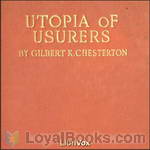 A Utopia of Usurers
A Utopia of Usurers
“Now I have said again and again (and I shall continue to say again and again on all the most inappropriate occasions) that we must hit Capitalism, and hit it hard, for the plain and definite reason that it is growing stronger. Most of the excuses which serve the capitalists as masks are, of course, the excuses of hypocrites. They lie when they claim philanthropy; they no more feel any particular love of men than Albu felt an affection for Chinamen. They lie when they say they have reached their position through their own organising ability... | |
By: H. Rider Haggard | |
|---|---|
 The Wizard
The Wizard
Described by the author, best known for his King Solomon's Mines, as "a tale of victorious faith," this story begins on a Sunday afternoon in an English church. Most of the book, though, is set in Africa, and the adventure story is as engaging as any of Haggard's African tales. What makes this one different is the religious question: What has happened to miracles in the church? Is there any power left in Jesus' promise, "Whoso that believeth in me, the works that I do he shall do also, and whatsoever ye shall ask in my name, that will I do"? | |
By: George MacDonald | |
|---|---|
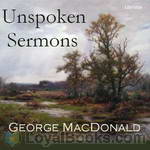 Unspoken Sermons
Unspoken Sermons
George MacDonald was a Scottish author, poet, and Christian minister. In his day he was considered one of the great Victorian authors on par with Dickens, Thackeray, Kipling and the like. His reputation as an author, however, has not fared as well largely because of the ubiquitous and fervent presence of religion throughout his works.MacDonald's theology, though sprinkled liberally throughout his fairly substantial number of books, is perhaps nowhere more palpable than in Unspoken Sermons. These sermons, though by no means amongst the most popular of MacDonald's work, have had theological impact from their first appearance... | |
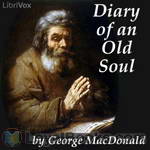 Diary of an Old Soul
Diary of an Old Soul
George MacDonald, a Scottish pastor, wrote these short poems, one for each day of the year, to help him with the severer misfortune he was experiencing. The poems are filled with hope and promises of Christ, yet, he also writes about his doubts. These poems are wonderful to listen to for people of any religion. | |
 Alec Forbes of Howglen
Alec Forbes of Howglen
| |
 Miracles of Our Lord
Miracles of Our Lord
Actions, it is often said, speak louder than words. But in the life of Christ - as George MacDonald shows - both spoke with an equal volume. Much attention is often devoted to what Jesus said while He was on earth, but many in our modern age are puzzled by the miracles. What are we to make of them? MacDonald - wise and gentle as ever - invites us into the miracles as a doorway into the inner life of Christ that we may intimately know Him and His Father. | |
By: Jacob Abbott (1803-1879) | |
|---|---|
 Caleb in the Country
Caleb in the Country
| |
By: James Allen | |
|---|---|
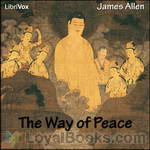 The Way of Peace
The Way of Peace
The Way of Peace is your guide to the power of meditation; self and truth; the acquirement of spiritual power; the realization of selfless love; entering into the infinite; saints, sages, and saviors; the law of service; and the realization of perfect peace. | |
By: John Bunyan (1628-1688) | |
|---|---|
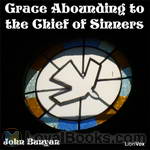 Grace Abounding to the Chief of Sinners
Grace Abounding to the Chief of Sinners
Grace Abounding is the spiritual autobiography of John Bunyan, who also penned Pilgrim’s Progress, perhaps one of the most significant pieces of Christian literature, second only to the Bible. Grace Abounding follows Bunyan’s struggle to find true repentance and forgiveness, his battle with Satan’s temptations of unbelief, his comfort found in the Bible and his overarching victory gotten by the grace of God through Jesus Christ his Son. Readers familiar with Pilgrim’s Progress will recognize... | |
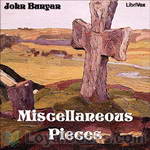 Miscellaneous Pieces
Miscellaneous Pieces
John Bunyan (November 28, 1628 – August 31, 1688), a Christian writer and preacher, was born at Harrowden (one mile south-east of Bedford), in the Parish of Elstow, England. He wrote The Pilgrim’s Progress, arguably the most famous published Christian allegory. In the Church of England he is remembered with a Lesser Festival on 30 August. Bunyan became a popular preacher as well as a prolific author, though most of his works consist of expanded sermons. In theology he was a Puritan, but there was nothing gloomy about him. The portrait his friend Robert White drew, which has often been reproduced, shows the attractiveness of his true character. | |
 The Pilgrim's Progress from this world to that which is to come
The Pilgrim's Progress from this world to that which is to come
| |
By: John Bunyan (1628-1688) | |
|---|---|
 Pilgrim's Progress in Words of One Syllable
Pilgrim's Progress in Words of One Syllable
The Pilgrim's Progress from This World to That Which Is to Come is a Christian allegory written by John Bunyan and published in February, 1678. It is regarded as one of the most significant works of religious English literature, has been translated into more than 200 languages, and has never been out of print. The author says in the preface " I have endeavored as far as possible to avoid hard and technical expressions, and I cannot but think that the mere fact of the brevity of the words must be a great attraction to beginners of all ages. | |
By: John Milton (1608-1674) | |
|---|---|
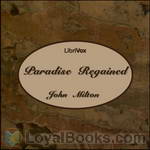 Paradise Regained
Paradise Regained
Paradise Regained is a poem by the 17th century English poet John Milton, published in 1671. It is connected by name to his earlier and more famous epic poem Paradise Lost, with which it shares similar theological themes. Based on the Gospel of Luke’s version of the Temptation of Christ, Paradise Regained is more thoughtful in writing style, and thrives upon the imagery of Jesus’ perfection in contrast to the shame of Satan. | |
By: Andrew Lang (1844-1912) | |
|---|---|
 Myth, Ritual and Religion — Volume 1
Myth, Ritual and Religion — Volume 1
| |
 Tales of Troy: Ulysses the Sacker of Cities
Tales of Troy: Ulysses the Sacker of Cities
These are short stories about the life of Ulysses, the stealing of Helen, Paris, battles, Trojan horses, and more! | |
 John Knox and the Reformation
John Knox and the Reformation
| |